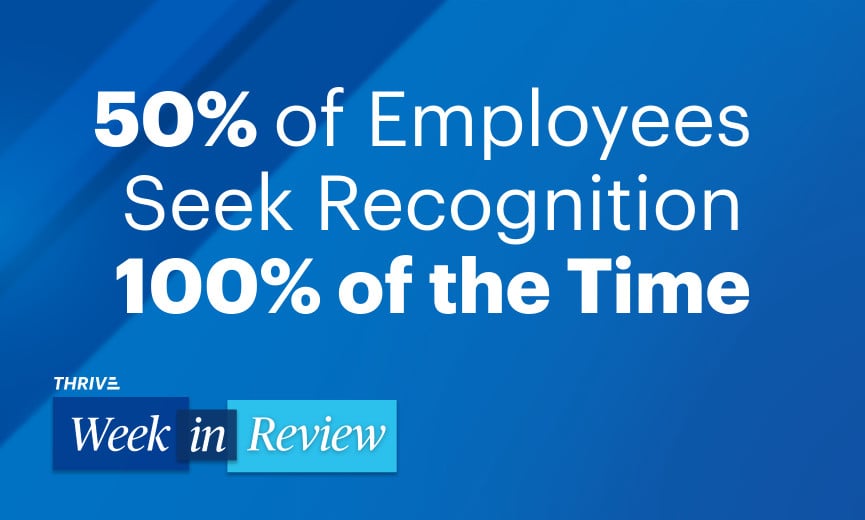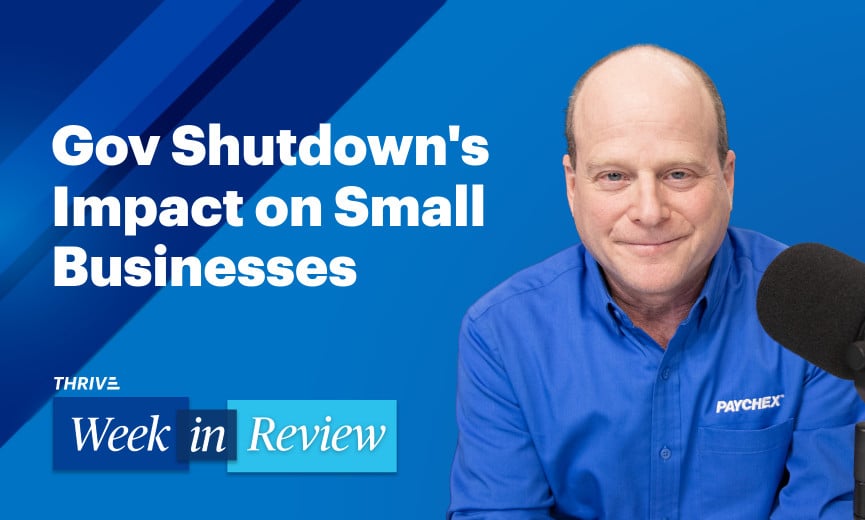- Thrive
-
Season
4Episode105
NLRB Sued over Joint Employer Rule, Minimum Wages, and Government Contract Availability

Podcast •

Summary
It took less than a day for the NLRB’s Joint Employer rule to face opposition, including a lawsuit from the U.S. Chamber of Commerce and industry groups most affected such as franchising. Gene Marks also says the rule is no good and shares his thoughts. Meanwhile, businesses in some states have to prep for minimum wage hikes in 2024, while more than half of small businesses are unaware of the how to gain a piece of the $84 billion in government contracts available to them. Listen to the podcast for details.
View Transcript
[Gene Marks, host]
Hey, everybody, this is Gene Marks, and welcome to this week's episode of the Paychex Week in Review podcast, the THRIVE podcast. This is the podcast where we take a few items of news during the week and talk about them, but as they impact your small business. So, let's get to it.
Remember I told you a little bit about the Joint employer rule a couple of weeks ago. That is the rule that is a was established by the, you know, previously, but the National Labor Relations Act has issued a final rule around it. And what it is, is it's when two or more entities may be considered joint employers of a group of employees if each entity has an employment relationship with the employees and if the entity share or co-determine one or more of the employees essential terms and conditions of employment, such as wages, and hours of work, and scheduling.
It's really created quite the kerfuffle because, you know, what this joint employer rule does is make franchisees, some government contractors, some staffing agencies, even companies like mine that have people that are not necessarily my employees, but they're employees of others. But, I do have control over their scheduling or how much they get paid. In some cases. You know, I could be considered to be a joint employer of those employees. It means those employees, if they if it's a large enough organization, can unionize. So, those companies are now subject to that, as well as go after bigger benefits and more pay because there's a larger corporate parent involved in the case of franchisees or whatever.
So, as you might not be so surprised to hear the National Labor Relations Board is being sued by the U.S. Chamber of Commerce and other business groups this past week seeking the rescission of the new joint employer rule the agency recently issued. This rule is “as destabilizing as it is unlawful,” says of the lawsuit, which was filed in a U.S. district court. This is, by the way, according to a story in businessinsurance.com.
The rule, which replaces a 2020 rule that was approved during the Trump administration and has now been rescinded, of course, and this new version of it is causing quite a problem.
So, the lawsuit charges that “the rule displaces widely accepted common law standards governing the scope of employment relationships, establish entirely new tests of employer liability, reconfigures relationships among legally separated entities, erases distinctions between contracts and employers, and threatens billions of dollars in liability and costs”, according to the article.
So, the U.S. Chamber and some other business groups are suing the National Labor Relations Board. For you, how does this impact you? Well, if you were an owner or if you're a, you know, a subcontractor of a government contractor, or if your business either has control over somebody else's employees or some larger company exerts control over you, that could impact how you pay those employees, how you hire and terminate employees, and whether or not those employees can go for unionization. But because of this lawsuit, things are probably going to be on hold for a while.
So, keep an eye out on this lawsuit. This joint employer issue is not going to go away.
Next, there is an article about minimum wage. This is on NBC, Philadelphia.com – my hometown – minimum wage hikes are coming across the United States in 2024. Get ready, guys! This is in states from California to Nebraska, Delaware, Maryland, and Hawaii.
The most notable wage increase of all may be California’s targeting fast-food companies, which begins on April 1, 2024, and will probably set a minimum wage of about $20 an hour. But minimum wages are going to affect employers of all sizes.
So right now, 30 states and Washington, D.C. have minimum wages above the federal wage of $7.25, according to the National Conference of State Legislatures. Some states have set the bar significantly higher than the federal rate, and in many cases, levels are slated to rise in 2024. Hawai’i, for example, is going to raise their minimum wage to $14 an hour in January, up 16.7%. Last year in Hawai’i, the state said a plan for its minimum wage by 2028 to go up to as high as $18 an hour.
Nebraska's rate is going up in 2024, from to $12 from $10.50. Maryland's rate is going up to $15 an hour from $13.25 if you have more than 15 employees. And even Delaware, their minimum wage is rising to $13.25, up from the current level of $11.75. Remember, the federal minimum wage is $7.25 an hour.
So, whether or not your state is going to be impacted by minimum wages, you need to be prepared for this. There is this long ongoing debate about whether or not minimum wages hurt or harm businesses and employees; on the one side, people say that they get paid more, they turn around, they can sustain themselves better, they can spend more money, and it's overall good for the economy. Supporters of the minimum wage hike also say in the studies to prove that even when raising the minimum wage, it has not driven businesses out of business – they just turn around and pass the cost down to customers.
A lot of businesses are against raising the minimum wage for obvious reasons. It increases your costs, and even though some can pass those costs down to customers, many businesses don't have that flexibility, and that's also an issue.
Bottom line is, though, is that it's going up in many states this year. So, you really want to keep an eye out to see if your state and your business is affected.
Finally, there was a new survey that came out from a company called Set Scale, it's a purchase order financing company, and it released a survey about businesses taking advantage of government contracts, right?
Like more than a half – this is like 52% of the businesses surveyed – they revealed that they aren't aware of the specific contracts the U.S. federal government awards to small businesses each year. They're missing out on approximately $84 billion a year. Remember, more than half of U.S. small businesses are unaware of federal contracts.
Now, government contracts, according to their press release, are well valued and often serve as a gateway to a steady source of income and small business growth. More than 70% of the businesses they surveyed said they're aware of lucrative and reliable government contracts, but more than half say they don't know what's the specific contract available to them. And over a quarter of U.S. small businesses – 29% of them – are completely unaware that the federal government awards contracts to small businesses.
Government contracts are fierce competition for U.S. small-business owners for a reason, says Daniel Fine, who's the founder and CEO of Set Scale. They’re reliable, well-valued, and often lead to steady sources of income. However, due to a lack of knowledge in the specific government contract awarding process, business owners are unsure if they can fulfill the government's open purchase orders without pursuing a line of credit from a bank or financial institution.
In fiscal year 2022, guys, the US federal government awarded $162 billion in federal contracting opportunities to small businesses. Again, 52% of them said they were unaware of this. There's a lot of lost opportunities there.
So, here's what your takeaway is. Your business might be really eligible for a federal government contract or even a subcontract, as well. Where do you go to find these government contracts? Here's my advice to you. Go to your Small Business Administration office, go to SBA gov. Find who your local Small Business Administration or SBA office is. They provide this kind of consulting. You can ask them. By the way, you can also go to small business development centers around the country. Also, they're also part of the SBA.
You can ask the Small Business Administration, “This is the industry that I'm in. This is the size of my business.” Maybe, you're minority-owned or female-owned because there are special incentives for those businesses. You can take advantage and you might be eligible for federal contracts. Yes, you have to go through an application process and I'm sure there's red tape and bureaucracy, but even the SBA can help you out with that.
Eight-four billion (dollars) being lost and not taken advantage of by small businesses because they're just not aware of these federal contracts are out there, and I think that's a really important thing.
My name is Gene Marks and you've been listening to this week's edition of the Paychex THRIVE Week in Review. If you've got any advice you like or tips or any help in running your business or you'd like to suggest a guest, please visit us at payx.me/thrivetopics.
Thank you so much for listening. We will see you again next week. Take care.
This podcast is property of Paychex, Inc. 2023. All rights reserved.

 Apple Podcast
Apple Podcast Spotify
Spotify iHeartRadio
iHeartRadio








